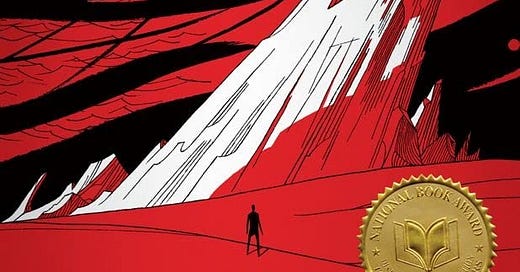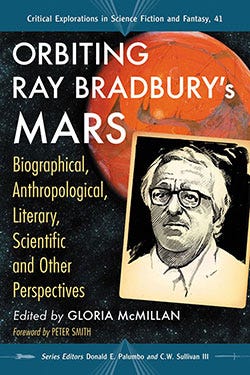Nota Bene: This post went out unexpectedly in the wee hours of Wednesday morning, and also went out in a draft form. I’m still not sure how that happened, though I’m confident it was a operator error of some kind. That threw off my schedule, so the full correct post is only making its way out today. For those who read the previous post, my bad.
Orbiting Ray Bradbury’s Mars: Biographical, Anthropological, Literary, Scientific and Other Perspectives. Edited by Gloria McMillan. Jefferson, NC: McFarland & Company, Inc., 2013.
In his introduction to The Martian Chronicles, playfully titled “Green Town, Somewhere on Mars; Mars, Somewhere on Egypt,” Bradbury describes the writing of the book: “ What began as an occasional story or ‘aside’ concerning the Red Planet became a pomegranate explosion in July and August of that year when I jumped to my typewriter each morning to find what rare new thing my Muse was willing to deliver” (The Martian Chronicles 5).
Bradbury made a name for himself publishing books that reached into the scientific grab bag of advancements being made in the Twentieth century and turning those ideas into something imaginative, something fantastical. Of his many stories, one of his most enduring tales remains The Martian Chronicles. Despite its timeline of events falling far short of the Chronicles’ foretelling, Bradbury’s exploration of the Red Planet continues to captivate the hearts and minds of readers in 2018, just as much as it did in 1950. Bradbury’s sweeping space opera leaves an impression greater than virtually any other Martian tale, making every story since then ring with an echo of Bradbury’s genius.
Given the depth and breadth of Bradbury’s vision of Mars, and all its implications for every realm of human existence makes any singular attempt at understanding the story difficult. Here, Gloria McMillan’s deftly edited collection of essays, Orbiting Ray Bradbury’s Mars, helps to touch on some of the most vital aspects of Bradbury’s world. Honoring the scale of The Martian Chronicles, and its place in American culture sixty years later, McMillan brings together scholars to examine Captain Wilder and the rest through the various lenses of biography, anthropology, literature, science, media representation, and even education. This approach comes close to embodying Bradbury’s own genre-crossing mentality, with the essays weaving in between literary study and scientific theory just as Bradbury penned horror and Western literature without a thought of staying within the lines (4). This is simultaneously the strength, and weakness, of this collection.
For instance, the insightful biographical essays by Sam Weller and Wolf Forrest offer much to those who want to more about Bradbury’s influences. But they also open themselves up to a kind of speculation, a “had Bradbury” done such-and-such questioning, that weakens the previous offerings (36). Likewise, the scientific essays, in which I would include both Part 2 on Anthropology and Part 4 on Science (from a more technical viewpoint, give the reader things to chew on which are significant, while occasionally getting into the weeds on technical aspects. These two groups of essays demonstrate that Bradbury was more than an imaginative thinker, but also someone who understood how the world works. Parts 3 and 5, the Literary and Media lenses respectively, were among the most narrowly focused in terms of Bradbury’s writing and vary regarding strengths. My own interests made Aaron Barlow’s essay “Usher II” of high import, while essays on ecocriticism and 1960s British Art Cinema held a kind of distant fascination. The final essay offers some thoughts on the teaching of Bradbury, presenting a fairly common pedagogical approach that I’d expect in an average public high school or a large state university.
What the collection seems to lack, from my own point-of-view, is a better reckoning with the very traditional nature of Bradbury’s writings. Though he wrote in the Science Fiction genre, the genre of “progress,” Bradbury was a “small c” conservative, which has always struck me as self-evident from reading his fiction. The Educational Lens essay presents this most clearly. McMillan does a great job of weaving the thoughts of her students, using their words, into the chapter. And this creates a real sense that her insights have substance, that her students are engaging Bradbury’s texts well. But her pedagogy also appears singularly focused, missing aspects which would challenge her own narratives and interpretation at time. When commenting on Bradbury’s inconsistent portrayals of his Martians, it’s because he is playing the role of the Trickster, just like the Native Americans who inspire much of his Martian characters (232). It does not occur to McMillan that the portrayal shows that Bradbury didn’t idolize Native cultures or that he even sometimes changed his mind. Such a view is limiting, both for the reader and likely for any students under such a teacher.
I consider this a small criticism in what is overall an interesting and enriching book. And I also take it demonstrate that there is still much more to say about Bradbury, his vision of Mars, and the myriad ways readers might still engage his writings. Given the renewed interest in Mars in our cultural moment, more people should give The Martian Chronicles a read. It may not answer questions about how to colonize the Red Planet, but it will certainly give Earthmen things to think about regarding their own shortcomings, desires, and potential.






Nice, Sean! I’ve got a bump this up in my to-read list.